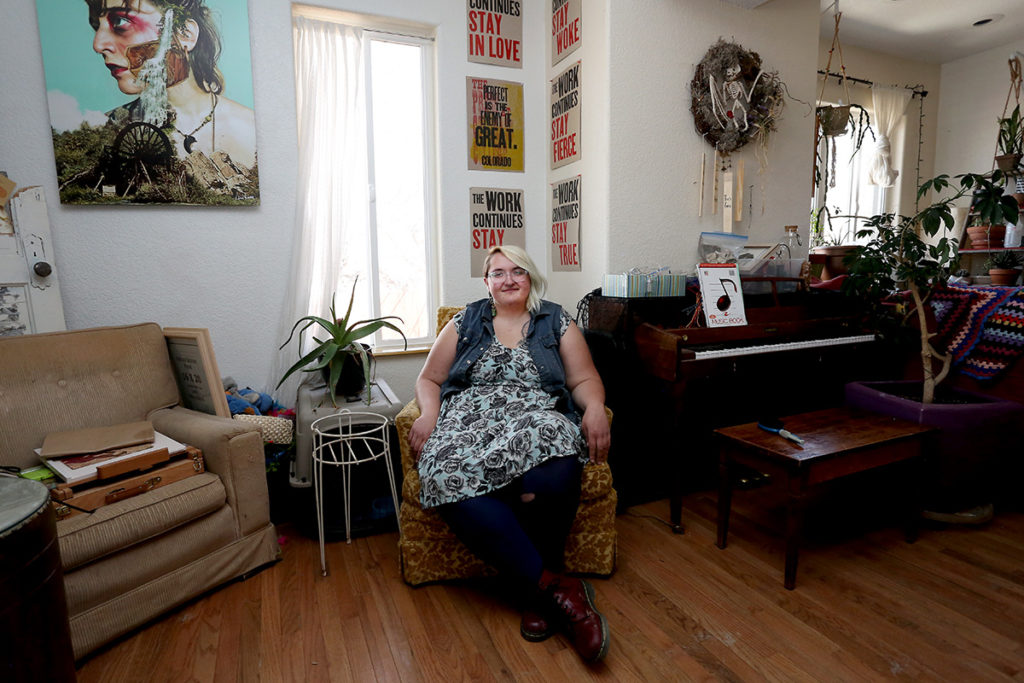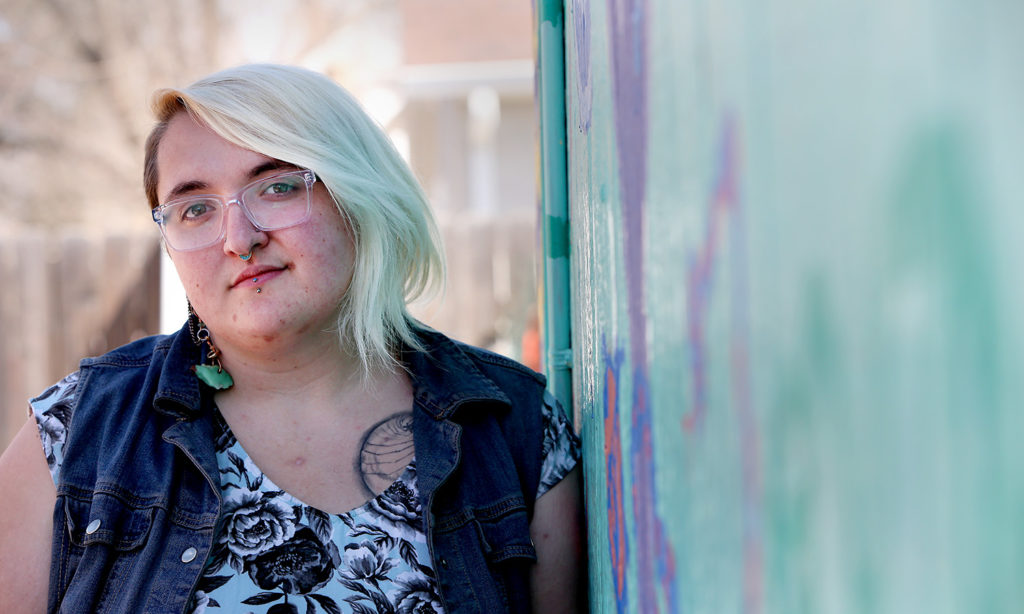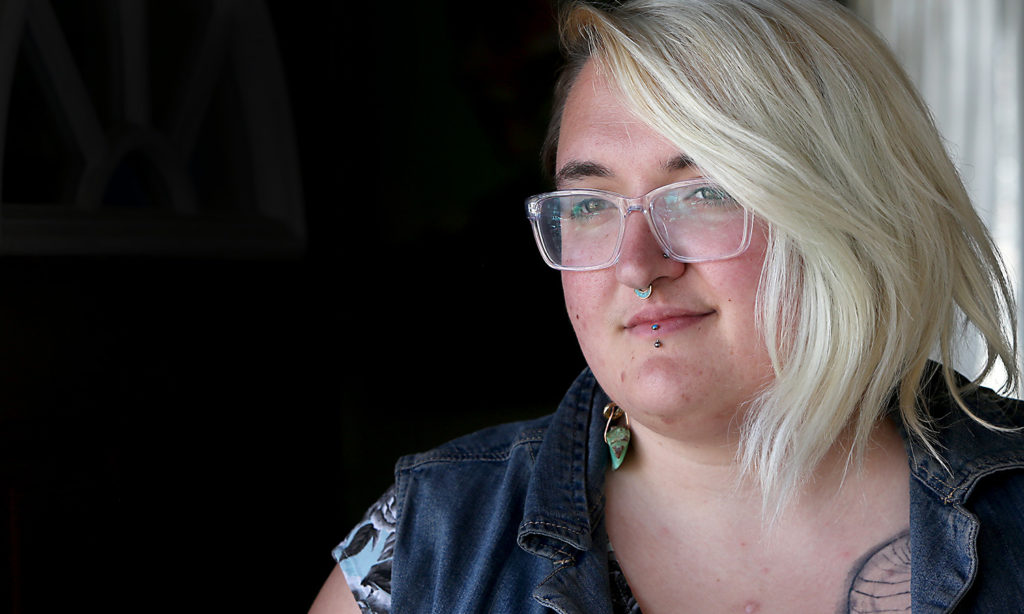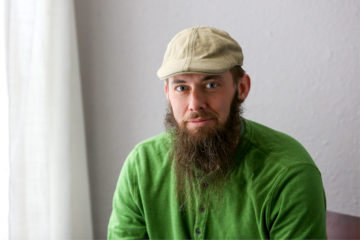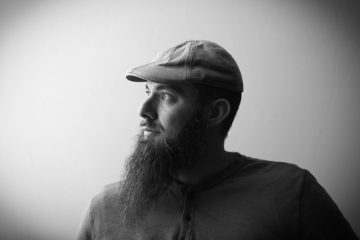After helping Nico Wilkinson feed sunflower seeds to the two resident goats of the Quaill Club in Colorado Springs, we sat down with a lot to talk about.
Nico, 25, works as a community organizer, poet, publisher, and spoken word performance artist who rattles cages, sparks laughs and loves to write about love. Among other things.
They sat with Humanitou in the living room of the Quaill Club, a homestead cooperative of queer artists, and talked about non-binary identity and the complicated nature of humanity. We talked about poetry, mental health, politics and getting close to the truth.
Nico’s insights are powerful and well-considered. They are delivered with an unapologetic authenticity. Meet Nico Wilkinson.
Humanitou: Let’s start with your poetry. On your Patreon page you say, “I perform poems on queerness, identity, body positivity, mental illness, and social justice. And quite a few love poems as well.” There’s a lot there.
Nico: There is a lot there. I think there has been a shift into the greater presence of spoken word, even though spoken word is a very ancient tradition of writing that has been present before written traditions.
It’s kind of made a comeback in the last few decades. There is a sort of goal of accessibility to that, of creating poetry that is meant to speak to people and their experiences in a way that can be understood in hearing it once, because you’re not sitting there analyzing the poem off of paper.
I think that for a long time there was this idea of the really reclusive poet that is writing in their office or their study, and then they publish their pieces, and it’s very enigmatic.
Now there’s a greater shift towards community through open mics and poetry slams, and poetry becoming a sort of church of getting together, and sharing human experience and connecting with others.
Humanitou: I’ve watched a video of you performing your poem, “Red Thread.” Your message is palpable. It felt like it also is something you’ve spent time with, that you deliver it from a place of scar not wound.
Nico: Whenever I’m writing for the stage or for publication, it does become a matter of: What am I trying to convey?
Of course, I can convey the essential nature of whatever pain I’m going through, but it’s kind of like a jagged stone. I need the time for it to tumble around in my mind for a while until it’s not something that’s pretty to look at but something where you get to see the essence of what are the different striations and what are the different markings that have influenced this?
In the moment, I can only see so far into the pain. It’s a matter of getting to the essence of it. I’ve tried, personally, to convey greater messages. Just the honesty, being honest without hurting myself and others in the process is my goal.
And I really love written word and I love reading poetry, and that experience. There’s a sort of intimacy in the solitude between the page and your own mind, and the way that it’s being interpreted. That’s why I do a lot of publishing work as well. It’s something that I really enjoy.
I started an anthology with my friend, Joy Young, in Phoenix who is also a spoken word poet. We run a press called Prickly Pear Printing, and our first anthology is, “We Grow Anyway,” which is queer poets explore love, growth and survival, trying to share narratives that are not always shared in a marginalized context.
There’s a lot of trauma and a lot of defining identity by the pain, rather than the joy and the ecstasy of it. (“We Grow Anyway”) is pieces that really are about celebrating identity and celebrating life.
Humanitou: You now identify as non-binary, rather than as gay or lesbian. Will you share what that means to you?
Nico: For me, it was kind of giving a try, because there was just something that didn’t quite fit in identifying as a woman who was a lesbian in my early life.
It was kind of a fit, but it wasn’t really. I was around a lot of people who identified as lesbians and there was this disconnect. It felt a little out of place. I figured I would see how it felt, and it was just a better fit.
It was like, you know, you wear the same pair of jeans and they’re always falling down, and you just get used to it. Then you put on jeans that fit and you’re like, “Oh. This is much better.”
There is this sort of misconception that sex is binary and gender is not. The idea that anatomy is binary and identity is not binary. Whereas neither is binary and everything is complicated.
There are people who are intersex and have different chromosomes. That’s because humans are complicated, and they’ve always been complicated.
The enforcement of binary gender has a long history within colonization and Western imperialism, whereas many cultures across the world have had understandings of non-binary gender long before a sort of religious and political impetus for binary understandings of gender.
It is worthwhile to experiment and to see what fits and not be afraid to pursue what might be the evolution of one’s identity, of what your soul has been waiting for.
I found after I came out and started identifying as non-binary there was this sort of greater feeling of freedom to explore gender and gender expression in any way that might manifest, be it quote-unquote masculine or quote-unquote feminine.
I say quote-unquote because I wouldn’t necessarily say that dresses are feminine. That’s all very arbitrary.
Humanitou: Courage is a word on my mind as I listen to you. The courage to be so fully engaged in one’s authenticity. There is risk in being fully you in a world that relies so heavily on perceptions of boundaries, definitions, presumed certainties.
Nico: Something I’ve been talking about a lot with my housemates, in particular, is the public versus private face of identity and of experiences. This space, this house is a cooperative living space for queer artists.
As a result of that mission, there’s a lot of conversations in the house that maybe we wouldn’t always feel comfortable having in their rawness around, like, dysphoria or experiences of invalidation or bigotry or anything like that that we experience outside of the home.
And I want to expressly state that it’s no one’s responsibility to educate anyone, especially because you never know where people are at in regards to mental health, in regards to understanding themselves or others, or their experiences with trauma and bigotry.
I think that poetry in a lot of ways is a big part of how I do quote-unquote educate people. That’s not by preaching and it’s not by saying, like, this is the thing. It’s instead by being incredibly human.
I think poetry, I’ve found, is a way for me to do that in a way that I have a lot of agency over, in that I’m telling my story, I’m choosing to tell it, I’ve decided what piece I’m going to do when I go on stage.
Language is limited. Understanding is limited. Everyone has filters, so everything is a game of telephone, right? In that way, I feel that poetry and art is a type of way of trying to get as close to the truth as possible, and as close to breaking down that wall between myself and another person.
Humanitou: You collaborated with the poet and playwright Idris Goodwin for a chapbook, “Inauguration.” Tell me about that experience.
Nico: It was written between November 8th (2016) and released on January 20th (2017), the inauguration.
I took a few of Idris’ classes when I was at Colorado College, and he’s been a huge inspiration to me. He is my mentor, in terms of what I’ve learned regarding being an artist and being a good community leader and educator. I’ve learned a lot from him.
When he messaged me — I think it probably was the day after the election — he said, “Do you want to write a book and release it on the inauguration.” I was like, “Absolutely.”
There were a few pieces that I’d had in the works, and a few pieces that I’d written that reflected an already existing political climate.
I wanted to get across in sharing pieces that I’d written about already, like the NAACP bombing in Colorado Springs, the Orlando shooting, “Mental Illness Testifies” is in there too, is that all of these things that we’re horrified by have been present, whether or not we’ve seen them.
One example. For a while I was in Minneapolis. I was studying there, writing for social change, and that was during the time of the Fourth Precinct occupation. I spent a lot of nights at the Fourth Precinct, protesting police brutality against people of color.
It was that night that there were people in trucks circling around, white supremacists in trucks circling around, gunning their trucks, trying to intimidate the people that were there. And then white supremacists came and shot some of the people there.
The reason that I share that is Charlottesville happened a few years later and everyone was so surprised, I was like, “Wait, this has been happening. White supremacists have been shooting people.”
Then, of course, Orlando happened before the election. And then these mass shootings, which are racially motivated, motivated by gender, by entitlement. These things have been happening and we’ve kind of scapegoated other things, like mental illness.
Really getting across the fact that none of this is new, these thoughts and these motivations have been present, and that is why we have the president that we have now. Otherwise, we wouldn’t. Just really trying to make that clear.
And working on that book was a real honor. The release show was at the Fine Arts Center, and it was a full house. They had to turn people away. It was a huge, huge show.
Humanitou: I’ve also watched a video of your “Mental Illness Testifies” performance. It gave me chills at multiple points.
Nico: “Mental Illness Testifies” might be the piece that got the most traction.
I write a few persona pieces, and that’s a piece where I embody mental illness in a courtroom, as the defendant. I am defending myself as not the one who caused all of these mass shootings that have been in the news.
Instead, saying the real culprits are racism and entitlement and sexism, and a lot of things that we enable as a society. As someone who is mentally ill that was a very odd thing to embody, in a way.
Humanitou: When you refer to mental health in your experience, what are you talking about?
Nico: Prior to even knowing that I was queer or gay or anything, I experienced struggles with mental health and depression. Twelve is the earliest time I can recall hitting a really intense depressive episode.
And what is that about, right? Some of it’s genetics, trauma, everything. So many things that can come into play. Some of it’s straight-up chemicals.
And I’ve stopped trying to really figure out the why aside from, there are whys in regards to certain behaviors, certain patterns that I have. Those are important for me to evaluate and work on.
Humanitou: I want to be extra clear to avoid someone potentially misinterpreting what you’re saying, given the collection of topics we’re talking about here. The mental illness you’re referring to is not connected to these matters of gender, sex and identity, correct?
Nico: You know it is funny. I did once see a therapist who didn’t seem to have a huge understanding of LGBTQ issues and identity, and actually asked me pretty repeatedly if I was depressed because I was gay. Or if I had a bad relationship with my mom, which I don’t. I have a pretty good relationship with my mom.
Eventually, I said, “Hey, that’s one of the better parts of my life, so we really don’t need to focus on that a great deal.”
I say it’s one of the better parts of my life in that I have such a wonderful community of people around me that came together from similar circumstances and experience of a similar identity. They really enrich my life.
Maybe it’s because I came out pretty early in high school. I don’t have a huge amount of baggage. I don’t have an intensely religious family, so there isn’t a great deal of trauma around my identity in that way.
But I have always struggled with body image. I struggled, having an eating disorder since I was 12. And so it’s hard to know where body dysmorphia ends and gender dysphoria begins.
In a way, everything is connected because humans are complicated. Things overlap and intersect. But what I can say is I don’t think there is an inherent connection between my experience of being queer and being depressed or having anxiety.
I can much more easily connect that with really high expectations I’ve always had for myself and issues of traumatic experiences with people that have led to certain social anxieties. Things like that. But that’s not so much attached to queerness.
Humanitou: What is the Quaill Club?
Nico: It stands for Queer Artists in the League of Love. That’s why there’s two Ls. People have asked if we raise quail. We don’t. (laughs) Just chickens and goats, and (we have) dogs and cats.
I had seen some spots in town that were co-ops that were spaces where people were trying to build something long-term, and the issue was that they were renting. Suddenly things got pulled out from under them. The time and the effort that they’d invested in the space didn’t quite pan out.
I started to think about, “Well, if I’m thinking of buying a home, that’s a really good opportunity to create a space where people can feel like the rug is not going to be pulled out from under them.”
It’s building towards a mission that people believe in and creating a safe space for people to live, to create, trying to provide resources for people to create here. We’ve had albums recorded here. We’ve had books made and we’ve had release shows for books here.
Being able to say, “Here’s this space. You can plant things, both figuratively and literally, and have a sort of harvest of your creative efforts,” is really important to me.
Humanitou: What does living your life in this creative, communal way mean to you?
Nico: I’m really grateful for people’s generosity and willingness to share resources in a creative sense. I think that that’s a big part of it, is the experience of community and the experience of working together with people, and getting to learn from people.
I think I’m at a point in my life in which I do engage in some sort of creative work every day. That doesn’t just look like writing a poem a day. For me, now that looks like, am I growing things?
Am I spending a little bit of time in the moment with, for instance, the animals around me? Am I having good conversations with my roommates that help us grow and get a better understanding of each other in the world? Am I organizing events that are beneficial for my community?
I’m at a point where I’m literally trying to create things. I’m really pleased about that.
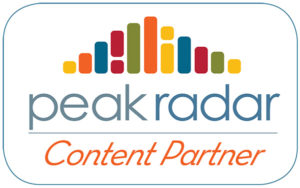 This Humanitou conversation is cross-posted at PeakRadar.com. PeakRadar.com is the Pikes Peak region’s cultural calendar and digital cultural center, connecting residents and tourists with our vibrant arts community. Your source for what’s happening is PeakRadar.com!
This Humanitou conversation is cross-posted at PeakRadar.com. PeakRadar.com is the Pikes Peak region’s cultural calendar and digital cultural center, connecting residents and tourists with our vibrant arts community. Your source for what’s happening is PeakRadar.com!
